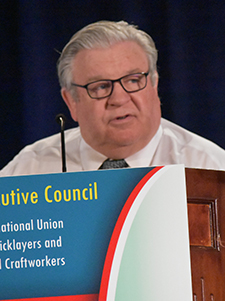
NEW ORLEANS—Every Democratic presidential hopeful has already told construction union leaders they support key building trades issues, Bricklayers President Jim Boland says.
In a March 13 interview with People’s World during the AFL-CIO Executive Council meeting in New Orleans, Boland explained the hopefuls made those pledges during closed-door meetings “several weeks ago” with all the presidents of North America’s Building Trades, the old AFL-CIO Building and Construction Trades Department.

The presidents welcomed the support, Boland said, but the question on their mind is electability.
The building trades leaders were the first union leaders to talk with all the candidates. Other union presidents interviewed at the AFL-CIO meeting said they had yet to meet with the Dems, and were hoping candidates would reach out to them and their members.
The sessions with the Democratic candidates occurred during a regularly scheduled meeting of the building trades union leaders. There were so many of them, however—14 at the time—that a second meeting occurred.
“They all talked about infrastructure, Project Labor Agreements, and the Davis-Bacon Act,” the top three issues for the nation’s construction unions, Boland explained. “They’re all good on our issues. The question is ‘Can they win?’”
“It’s crazy there are so many candidates,” Boland said. “But the most important thing is to get a candidate who can beat Trump” next year.
That’s a painful lesson for building trades leaders after the 2016 presidential campaign.
Then-GOP nominee Donald Trump attracted many of their members’ votes, especially in the key Great Lakes swing states he won by narrow margins—Pennsylvania, Ohio, Wisconsin, and Michigan—which gave him the election.
Exit polls after the balloting showed union members and their families in those four states split 50-50 between Trump and Democratic nominee Hillary Clinton. And Building Trades President Sean McGarvey said Trump won 52 percent of his unions’ members in Ohio.
Trump’s promises—especially on infrastructure—attracted them, and he repeated those ideas when he addressed the building trades’ legislative conference in D.C. in early 2017, but he hasn’t followed through. And Boland added “2016 taught us Trump will do anything to win. There’s the Russian factor and bots and Facebook,” referring to the Russian government’s election interference.
Congressional Republicans, with few exceptions, have opposed the building trades on Davis-Bacon and PLAs.
And the far-right so-called House Freedom Caucus—the tail that has wagged the GOP dog for years—opposes infrastructure spending, too. In addition, Trump wants to turn over most of the nation’s infrastructure work, especially road-building, to the private sector. He also wants to shortchange it of federal funds.
Trump’s budget for the fiscal year that starts Oct. 1 would allot $200 million for federal funding for building and rebuilding roads, bridges, and subways. That’s far from the $1 billion figure Trump keeps throwing around in speeches, or the $2 trillion in unmet U.S. infrastructure needs, according to the American Society of Civil Engineers.
Other Republicans consistently try to repeal Davis-Bacon and to scotch Project Labor Agreements. Both measures, especially Davis-Bacon, improve construction workers’ wages.
Davis-Bacon, which the GOP-run Congress passed and GOP President Herbert Hoover signed in 1931, mandates locally prevailing wages on federally funded construction. PLAs, signed by unions with their contractor and builder partners, set working conditions, grievance procedures, and labor standards for specific projects, in return for hiring unionists to build them.
The PLAs guarantee the projects will come in on time, on budget, and with guaranteed ways to solve worker complaints against bosses.
Anti-worker, cut-rate construction contractors and their lobby, the Associated Builders and Contractors, have led efforts to repeal Davis-Bacon and ban PLAs for years. Their key mouthpiece in Congress is Rep. Steve King, R-Iowa, now infamous for his support of white nationalism.
By constructing bipartisan coalitions, the building trades have defeated King every time he’s tried to dump Davis-Bacon. They also convinced the Democratic Obama administration to consider PLAs when awarding construction contracts for federal projects. Trump has yet to revoke that Obama executive order.
The construction unions have one other concern, Boland said: The quality of jobs from the “Green New Deal” concept transitioning the U.S. completely away from reliance on fossil fuels within a few decades. The Bricklayers, the Steelworkers, and several other unions are members of the BlueGreen Alliance, a labor-environmental coalition pushing for investing in factories to make components, such as wind farm blades and solar panels, for “clean” energy.
The concern is that the jobs in such plants be middle-class jobs.
“We need a New Deal for the Green New Deal,” Boland said.










